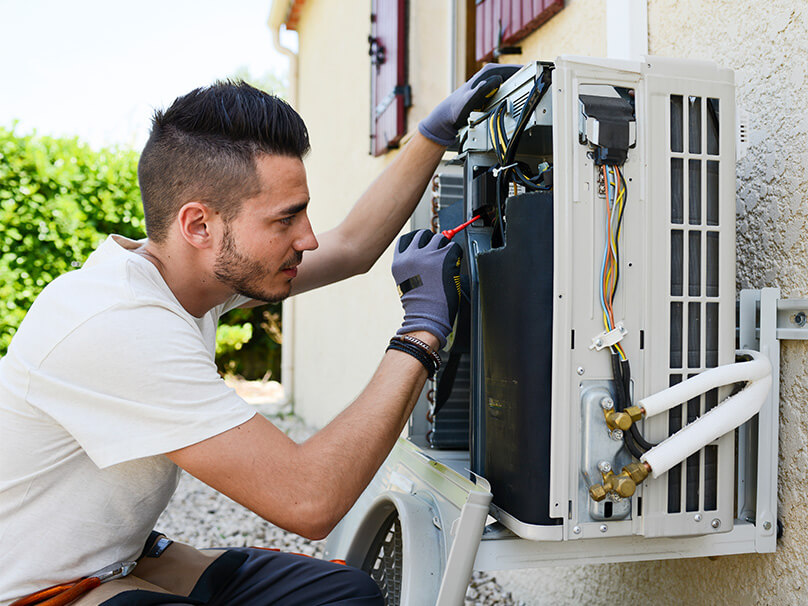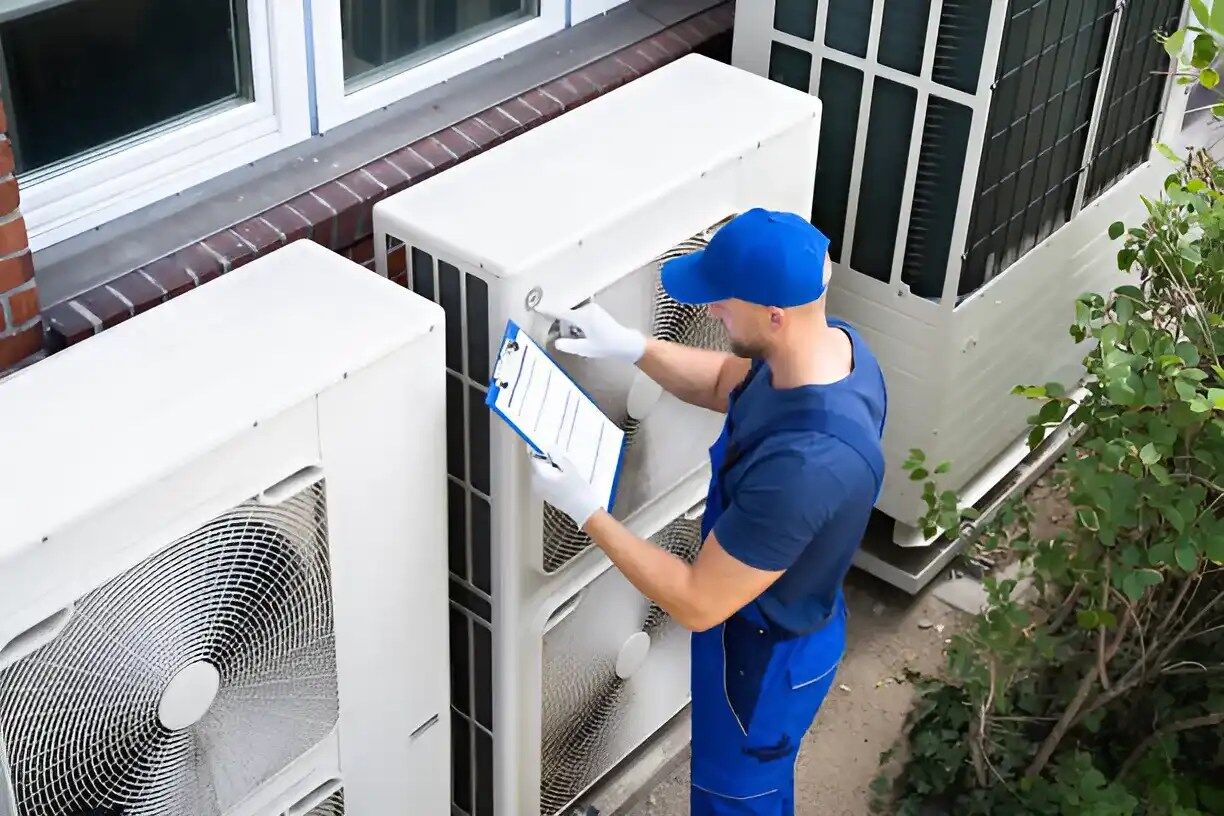The Only Guide to Air Conditioner Repair Near Me
The Only Guide to Air Conditioner Repair Near Me
Blog Article
The Ultimate Guide To Repair Air Conditioner Near Me
Air conditioning Repair Near Me: Specialist Cooling System Repair Ensures Your Home Stays Comfy Throughout The Year
Kinds Of Air Conditioner Systems
When taking on air conditioning repair work, understanding the type of cooling system you're dealing with can conserve time, money, and irritation. Ever questioned why some units cool a space click here much faster than others? Or why specific systems seem to break down more often? Let's peel back the layers.
Central Air
Air Conditioner Repair Near Me - An Overview
Think of a cool breeze flowing through a whole house, whispering convenience into every corner. Central air conditioning systems do precisely that. They use a network of ducts to distribute cooled air, depending on a compressor and condenser outside, coupled with an evaporator coil inside. However when this complex monster falters, determining the issue can be like discovering a needle in a haystack.
Split Systems

Split systems are a popular choice for many homes-- part indoor system, part outdoor compressor. They use versatility and efficiency, but their dual nature implies repair work can involve either part. Have you ever heard a strange noise outside your house only to discover the indoor system isn't cooling? That's a timeless sign of a split system problem.
The Single Strategy To Use For Air Conditioner Repair Near Me
Window Units
These compact warriors fight summer season heat by fitting snugly into a window frame. They combine all parts into a single box. Their simpleness often implies less repair work headaches, but ignoring filters or enabling particles accumulation can cause diminished performance or breakdowns.
Ductless Mini-Splits
Repair Air Conditioner Near Me for Beginners
Ductless systems bypass ductwork completely, making them perfect for homes without existing ventilation. They're quiet, effective, and remarkably durable. When repairs are required, service technicians should be adept at dealing with refrigerant lines and electrical connections-- no small task.
Quick Recommendation Table
| Type | Secret Features | Typical Repair Issues |
|---|---|---|
| Central Air | Ductwork, whole-house cooling | Duct leaks, compressor failure |
| Split System | Indoor & & outside systems | Refrigerant leaks, fan motor problems |
| Window System | All-in-one, simple installation | Unclean filters, electrical faults |
| Ductless Mini-Split | No ducts, zoned cooling | Line leakages, sensor malfunctions |
Facts About Fix Air Conditioner Revealed
Unwinding the Most Regular AC Issues
Have you ever questioned why your air conditioning unit suddenly stops cooling during a sweltering afternoon? One typical perpetrator is an unclean or blocked air filter. This tricky bad guy limits airflow, requiring your system to work overtime, which not only lowers efficiency but can likewise cause premature breakdowns. Envision attempting to breathe through a scarf taken in dust-- it's exhausting!
Another frequent hiccup is refrigerant leaks. These unnoticeable leakages do not simply decrease cooling power but can likewise damage the compressor, the heart of your air conditioning unit. How frequently do you examine for uncommon hissing sounds or ice formation on the coils? Catching these signs early can save you from pricey repairs down the line.
Beyond the Essentials: Lesser-Known Issues
How Fix Air Conditioner can Save You Time, Stress, and Money.
Often, the thermostat itself is the troublemaker. Miscalibrated or faulty thermostats send mixed signals, causing the AC to cycle erratically. Ever experienced your a/c turning on and off in rapid succession? That's called brief biking, a sneaky efficiency drainer that can wear out parts faster than you 'd expect.
Electrical issues, such as used wiring or a malfunctioning capacitor, might lurk underneath the surface. Air Conditioning Repair. These often manifest as a/c systems stopping working to begin or suddenly closing down. An expert eye knows to evaluate these elements with precision tools, something a casual look won't expose
Specialist Tips for Diagnosing Common Air Conditioning Problems
Air Conditioner Repair Near Me Things To Know Before You Get This
- Check and change air filters routinely-- every 1 to 3 months depending on usage and environment.
- Listen for unusual sounds like rattling or buzzing that might indicate loose parts or electrical faults.
- Inspect the outdoor unit for particles or obstructions that hamper air flow and cause overheating.
- Look for frost buildup on evaporator coils, a hint towards refrigerant issues or airflow limitations.
- Test the thermostat settings and recalibrate if the temperature level readings feel off.
Quick Reference Table: Symptoms & & Probable Causes

| Sign | Probable Cause | Specialist Tip |
|---|---|---|
| Warm air blowing | Low refrigerant or unclean coils | Tidy coils and look for leakages right away |
| Short cycling | Thermostat concerns or oversized unit | Adjust thermostat settings and seek advice from sizing standards |
| System won't start | Electrical faults or capacitor failure | Test electrical wiring and replace capacitors as needed |
| Water leakage | Obstructed drain line or frozen evaporator | Clear drain lines and examine for coil icing |
DO IT YOURSELF A/c Upkeep Tips
3 Simple Techniques For Air Conditioner Repair Near Me
Ever seen your a/c sputtering like an old engine on a hot summer season day? Neglecting subtle indications often indicates more than just a sweaty afternoon-- it's a start to unforeseen air conditioning repair costs. What if you could catch those whispers before they turn into wails? Regular DIY maintenance can be your very first line of defense.
Simple Steps to Keep Your A/c Running Smoothly
The Main Principles Of Repair Air Conditioner Near Me
- Clean or Replace Filters: A clogged up filter is like attempting to breathe through a headscarf. Every 1-3 months, check and swap out your filters. It enhances air flow and performance, avoiding compressor strain.
- Inspect the Condenser Coils: Dust and particles function as undetectable blankets smothering your system's cooling power. Gently brush or vacuum the coils, but prevent harsh chemicals that might deteriorate the metal.
- Examine the Drain Line: When was the last time you looked at your drain pan? A stopped up drain can cause water leakages and foster mold development. Flushing it with a vinegar option regular monthly keeps the circulation clear.
- Seal and Insulate: Are your ductworks whispering leaks? Sealing spaces with mastic or foil tape boosts efficiency and reduce unequal cooling.
Pro Tips Beyond the Fundamentals
- Step your unit's voltage to capture subtle electrical wear before it triggers big issues.
- Listen for uncommon hums or rattles-- these acoustic breadcrumbs typically indicate loose parts or failing motors.
- Keep outdoor units shaded but make sure at least two feet of clearance around them for optimal airflow.
Ask yourself: Are you hearing your air conditioning's quiet SOS or just awaiting it to scream? Taking time for DIY a/c upkeep transforms reactive repair work into proactive care, conserving sweat, stress, and yes, money.
The Basic Principles Of Ac Repair
Why Expertise in AC Repair Matters
Picture this: your air conditioner unit sputters and groans throughout a scorching afternoon, leaving you sweltering inside your home. Would you rely on a newbie fumbling with fragile components, or would you seek the peace of mind of a professional air conditioning technician!.?.!? The complexities of contemporary air conditioning systems demand precision and experience. A small mistake can escalate a minor breakdown into a pricey disaster.
Ac Repair Fundamentals Explained
Hidden Complexities Behind the Cool Breeze
Many underestimate the layers hidden beneath the smooth exterior of an a/c unit - Air Conditioner Repair Near Me. From refrigerant leakages that silently drain pipes efficiency to malfunctioning thermostats that misread temperature levels, these concerns require more than a basic toolkit. Professionals possess a keen eye for identifying issues that balance property owners ignore
Essential Tips for Selecting the Right Professional
Not known Facts About Ac Air Conditioner Repair
- Accreditation and Training: Confirm qualifications; a professional trained in the current heating and cooling innovations is indispensable.
- Experience with Particular Systems: Not all AC units are developed equivalent; discover somebody familiar with your design's peculiarities.
- Diagnostic Technique: Knowledgeable technicians use sophisticated tools-- like electronic leakage detectors and thermal imaging-- to pinpoint covert faults.
What to Get out of a Pro's Diagnostic Process
| Step | Purpose | Specialist Insight |
|---|---|---|
| Visual Inspection | Recognize apparent wear or damage | Search for rust or unusual sounds-- an indicator frequently disregarded |
| Pressure Evaluating | Detect refrigerant leakages | Subtle pressure drops can hint at micro leakages undetectable to the naked eye |
| Electrical Testing | Guarantee circuit integrity | Loose connections can simulate extreme mechanical failures |
Air Conditioning Repair Can Be Fun For Everyone
Why Do It Yourself Frequently Falls Short
Tempting as it is to play with your air conditioning unit, DIY fixes frequently miss the source. For circumstances, completing refrigerant might briefly cool your space however ignores leaks that intensify gradually. Professional technicians don't just spot signs; they pursue the underlying mechanical and electrical faults that sap performance.
The Definitive Guide to Air Conditioning Repair
Concerns to Ask Before Working with
- What diagnostic tools do you use to determine concerns?
- Can you discuss the repair work process and anticipated results?
- Are you acquainted with the refrigerants suitable with my unit?
- Do you follow security protocols for managing electrical elements?